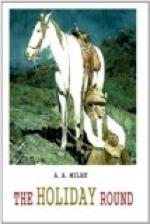“Is making a will so very difficult?”
“It’s a very tricky and complicated affair indeed. However, I think we shall pull it off. Er—might I send an important business telegram?”
“Macmacmacmacmac, London,” wrote John. “Very knotty case. Date of return uncertain. Please send more cash for incidental expenses.—Blunt.”
. . . . . . .
Yes, you have guessed what happened. It is an everyday experience in a solicitor’s life. John Blunt and Amy Masters were married at St George’s, Hanover Square, last May. The wedding was a quiet one, owing to mourning in the bride’s family—the result of a too sudden perusal of Macnaughton, Macnaughton, Macnaughton, Macnaughton & Macnaughton’s bill of costs. As Mr Masters said with his expiring breath—he didn’t mind paying for our Mr Blunt’s skill; nor yet for our Mr Blunt’s valuable time—even if most of it was spent in courting Amy; nor, again, for our Mr Blunt’s tips to the servants; but he did object to being charged the first-class railway fare both ways when our Mr Blunt had come down and gone up again in the car. And perhaps I ought to add that that is the drawback to this fine profession. One is so often misunderstood.
THE PAINTER
Mr Paul Samways was in a mood of deep depression. The artistic temperament is peculiarly subject to these moods, but in Paul’s case there was reason why he should take a gloomy view of things. His masterpiece, “The Shot Tower from Battersea Bridge,” together with the companion picture, “Battersea Bridge from the Shot Tower,” had been purchased by a dealer for seventeen and sixpence. His sepia monochrome, “Night,” had brought him an I.O.U. for five shillings. These were his sole earnings for the last six weeks, and starvation stared him in the face.
“If only I had a little capital!” he cried aloud in despair. “Enough to support me until my Academy picture is finished.” His Academy picture was a masterly study entitled, “Roll on, thou deep and dark blue ocean, roll,” and he had been compelled to stop half-way across the Channel through sheer lack of ultramarine.
The clock struck two, reminding him that he had not lunched. He rose wearily and went to the little cupboard which served as a larder. There was but little there to make a satisfying meal—half a loaf of bread, a corner of cheese, and a small tube of Chinese-white. Mechanically he set the things out....
He had finished, and was clearing away, when there came a knock at the door. His charwoman, whose duty it was to clean his brushes every week, came in with a card.
“A lady to see you, sir,” she said.
Paul read the card in astonishment.
“The Duchess of Winchester,” he exclaimed. “What on earth—Show her in, please.” Hastily picking up a brush and the first tube which came to hand, he placed himself in a dramatic position before his easel and set to work.




